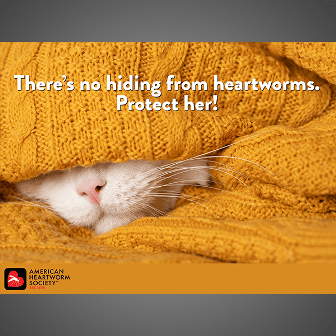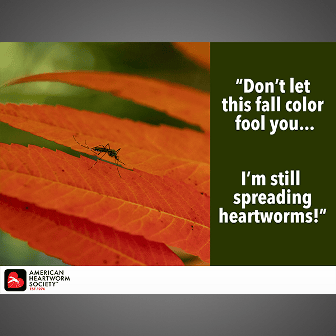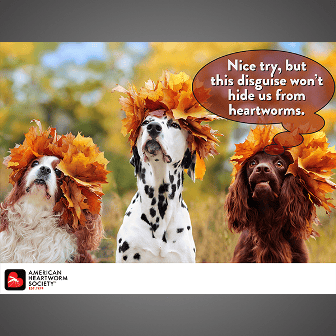When should we perform spay-neuter surgery in a heartworm-positive dog?
In dogs with mild infection and no clinical signs of heartworm disease, it is safest to perform spay-neuter surgery prior to beginning adulticidal therapy. At least one study described no evidence of clinically relevant perioperative complications when sterilizing heartworm-positive dogs, and many high-quality, high-volume spay-neuter clinics and shelters regularly engage in this practice. Adulticidal therapy may be administered upon recovery from anesthesia.
In cases when adulticidal therapy has already been initiated, anesthetic procedures should be delayed for 6 months to ensure clearance of dying worms.
How can we maintain exercise restriction and protect behavioral health in the shelter environment?
Minimizing physical activity, restricting exercise, and ensuring dogs are safely confined when unsupervised are important components of minimizing complications from heartworm treatment. To ensure success during recovery, steps should be taken to provide safe physical and mental stimulation and to meet dogs’ needs for social interaction.
Most dogs can be safely leash-walked during the treatment recovery period and providing appropriate chew toys can help relieve some of that stored up physical energy. During confinement, reading to dogs can help decrease arousal and stress and there are many simple, inexpensive ways to provide in-kennel enrichment. Taking advantage of feeding times to provide mental stimulation as well as ensuring that a variety of stimulating activities are provided can help keep the canine mind active and healthy.
Can heartworms be transmitted to unborn puppies?
Transmission of heartworms requires a bite from an infected mosquito, so direct transmission from a mother to her unborn puppies is not possible. It is possible for the microscopic baby worms (called microfilaria) to pass through the bloodstream of the mother into the puppies; however, these worms cannot develop into adults and should be eliminated when the puppies receive their first dose of heartworm preventive. Until the worms are eliminated, those infected puppies could serve as sources of infection for nearby mosquitoes and unprotected dogs.
Is it safe to give heartworm preventives to a pregnant or nursing dog?
All heartworm preventives are approved as safe and effective in breeding, pregnant, and lactating dogs when used according to label directions.
Is it safe to treat heartworms in a pregnant or nursing dog?
The use of melarsomine adulticidal therapy in pregnant dogs has not been studied. In cases where a litter will be carried to term, adulticidal therapy should be delayed until weaning unless immediate treatment for severe infection is indicated as a means of preserving life.
How can we decide if heartworm testing is the best use of our resources?
The American Heartworm Society believes it is in the best interest of all dogs greater than 6 months of age to be tested for both heartworm antigen and microfilariae on an annual basis and whenever a change in heartworm preventive medication is planned.
In the shelter setting, when allocating resources for diagnostic testing for any disease or condition, including heartworms, additional considerations should include assessment of impact on shelter operations, animal and human health, and specific disease characteristics.
Should we treat dogs with heartworms in our shelter?
As with diagnostic testing in shelters, understanding which diseases can be treated in a given organization and establishing sound treatment protocols requires careful consideration and resource assessment. (This Canine Parvovirus Treatment Resource Assessment may be a helpful model for other diseases including heartworm.)
Is it safe to relocate a heartworm-positive dog for adoption?
Relocation of heartworm-positive dogs should be reconsidered unless life-saving opportunities and resources can be provided at the destination. All dogs greater than 6 months of age should be tested and all dogs 8 weeks of age and older should be started on heartworm preventive therapy prior to relocation. When dogs test positive and relocation cannot be postponed, steps should be taken to minimize heartworm transmission in microfilaremic dogs.
Dogs that have undergone adulticidal therapy in preparation for relocation should not be transported for at least 4 weeks after melarsomine injection.
Can we treat dogs with two injections of melarsomine instead of three to get them out of the shelter faster?
The American Heartworm Society recommends that all dogs be treated with three doses of melarsomine for the safest and most efficacious adulticidal therapy. This course of treatment, consisting of one injection followed by two injections given 24 hours apart 1 month later, should result in the clearance of 99% of the worms.
For dogs with asymptomatic, mild, or moderate disease, melarsomine dihydrochloride is also labeled for two treatments given 24 hours apart. Limiting the treatment course to two treatments should result in the clearance of approximately 90% of the worms.
When choosing a treatment course in the shelter, efficacy, clinical safety, and duration of treatment must all be considered. Regardless of the course pursued, clear documentation of all treatments provided and recommendations for follow-up after adoption should be provided to each adopter.
Is there a cheaper alternative for heartworm treatment other than melarsomine?
Melarsomine dihydrochloride is the only treatment labeled for use as an adulticide and is the safest, most efficacious, and fastest way to ensure clearance of adult heartworms. Other therapeutic combinations may be effective; however, these all require a substantially prolonged treatment course to obtain equivalent worm death. The pros and cons of alternative treatment regimens should be carefully weighed.
When definitive adulticidal therapy with melarsomine cannot be provided immediately, heartworm-positive dogs should be started on a 4-week course of doxycycline and a monthly preventive with a macrocyclic lactone until such treatment can be provided. Exercise restriction should be maintained during this time.
Should dogs being treated for heartworms receive pain medications?
Pain, swelling, and tenderness at the melarsomine injection site are the most common treatment complications. These can be minimized through the use of careful injection technique and a variety of pain medications when needed. Administration of local anesthetics prior to injection is not recommended as these treatments carry their own risk of discomfort and can interfere with proper melarsomine injection.







